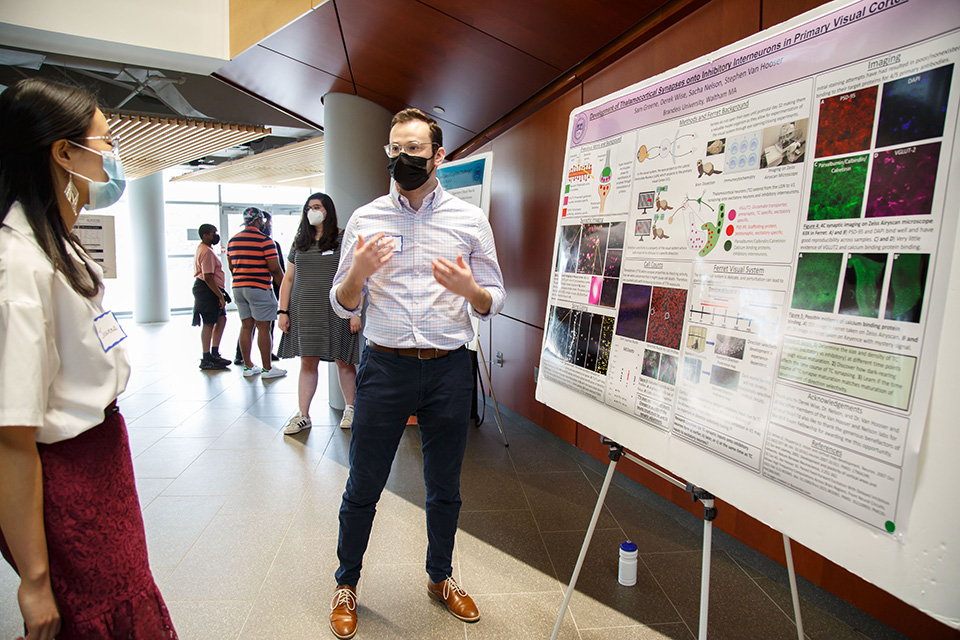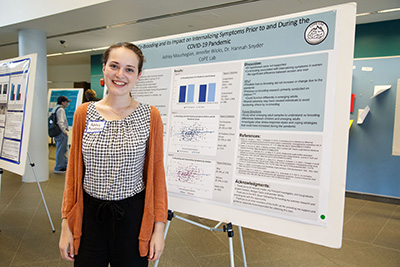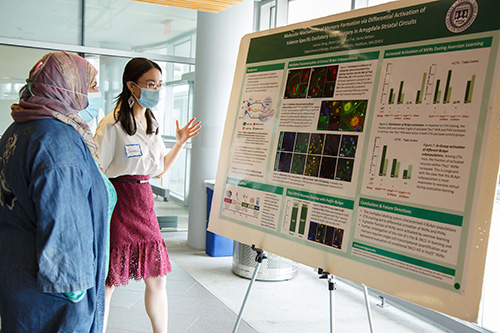Celebrating the sciences: SciFest 2022
Students with majors across the scientific spectrum came together to present their summer research findings.
 Photo/ Heratch Ekmekjian
Photo/ Heratch EkmekjianSam Greene '23 explaining his research.

Ashley Moushegian ’23 spent the summer studying 'cobrooding.'
Members of the Brandeis community came together on August 11th to celebrate the 11th annual SciFest event. This scientific showcase, featuring poster boards across the scientific spectrum, highlighted each student’s summer of research.
Students with a variety of majors, including biology, chemistry, physics, mathematics, computer science, psychology and neuroscience, spent their summer working alongside the faculty and graduate students mentors to uncover new findings in their chosen field.
In addition to explaining their research, participants shared their exciting scientific revelations and moments of personal growth.
Ashley Moushegian ’23, a psychology major, spent the summer researching ‘co-brooding’ behaviors among students. This concept, when two or more people come together to share negative feelings, is a newer idea in the world of psychology. When negative feelings are shared among the group, each person feels worse as a result, affecting mental health.
While past studies focused on elementary-aged children, Moushegian wanted to study her fellow classmates. She used the timing of the pandemic to study mental health among students, seeing if there was an effect from co-brooding. She didn’t find a correlation with the pandemic, but did see similarities between co-brooding effects on mental health.
Moushegian, who hopes to become a clinical therapist, believes her studies will impact the world of therapy beyond Brandeis.
“This research helped me understand that there are different ways people can develop mental illness,” said Moushegian. “I’m hopeful that my findings will contribute to therapy programs in the future.”
Moushegian’s research was funded by The M.R. Bauer Foundation at Brandeis University.

Spencer Clark '23 (left) with his mentor, chemistry professor Hao Xu.
Spencer Clark ’23, a biochemistry and chemistry double major, found that his research solidified his plans for graduate school.
His research, funded by the Blavatnik Family Foundation Summer Science Research Fellowships, focused on finding new ways to synthetically connect two sugars, an important discovery in the world of biochemistry. As he spent each day in the lab, he found himself growing more sure of his passion for the field.
“Chemistry requires a lot of effort. You need to show up daily, putting in the time to try to find new takeaways,” said Clark. “It really gave me a sense of what it will be like as a graduate student studying synthetic chemistry. Luckily, I really enjoyed it.”

Joanna Xiong ’23 (right) shares her findings.
Joanna Xiong ’23, a neuroscience major with a minor in Health Science, Society and Policy,
researched the molecular impact of memory formations in the brain, seeing different neurons that were activated during the memory process. Her biggest revelation was the power of leaning on others for support in the lab.
She found herself stepping out of her comfort zone by asking her peers in the lab to provide their insight on her project. Getting perspective from the fellow graduate students helped her form a well-rounded report.
“I had the chance to really practice my oral communications skills,” said Xiong. “I received so much support from my lab mates throughout the entire process. It was a great experience.”
Xiong’s research was funded by the Blavatnik Family Foundation Summer Science Research Fellowships
Sam Greene ’23, a biology major, found his confidence through his summer dedicated to research.His study focused on developments in the visual cortex of ferrets. He analyzed movement patterns in the brain, discovering that development occurs within two days after a ferret opens its eyes for the first time. He worked alongside Derek Wise, a graduate student who mentored him throughout the summer.
His research is in the preliminary stages, but he’s confident in his ability to move forward because of his mentor support and new-found confidence.
“My biggest takeaway is that anyone can do science,” said Greene. “I struggled to find my place at first, but I put in the work and time this summer. I made connections and really applied myself. Now I’m confidently ready to approach my thesis this year.”
Greene’s research was funded by The M.R. Bauer Foundation at Brandeis University.Categories: General, Humanities and Social Sciences, Research, Science and Technology, Student Life





